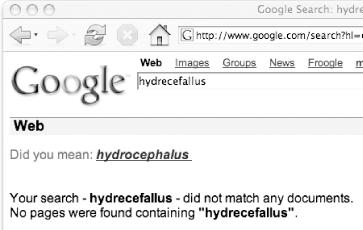Google sometimes takes the liberty of “correcting” what it perceives is a spelling error in your query.
If you’ve ever used other Internet search engines, you’ll have experienced what I call stupid spellcheck. That’s when you enter a proper noun and the search engine suggests a completely ludicrous query (“Elvish Parsley” for “Elvis Presley”). Google’s quite a bit smarter than that.
When Google thinks it can spell individual words or complete phrases
in your search query better than you can, it’ll
suggest a “better” search,
hyperlinking it directly to a query. For example, if you search for
hydrecefallus, Google will ask if you meant
hydrocephalus, as shown in Figure 1-16.
Suggestions aside, Google will assume that you know of what you speak and return your requested results, provided that your query gleaned results.
If your query found no results for the spellings you provided and
Google believes it knows better, it will automatically run a new
search of its own suggestions. Thus, a search for
hydrecefallus finding (hopefully) no results will
spark a Google-initiated search for hydrocephalus.
Tip
Given the sheer number of pages on the Web and the odds that at least one of the people proffering a page on the subject you’re after either can’t spell or can’t type, I don’t see these automatically generated searches based on Google’s suggestions coming up that often these days.
For instance, because two web pages cite this hack as it first appeared in the previous edition of this title, the hydrecefallus example is blown. And I couldn’t find another misspelling that both came up short on results and for which Google had any suggestions.
On the other hand—at least for now—a search for
spodding
oil texas turns up
only 4 results, while the same search with correct spelling
(“spudding”), spudding oil texas, returns 708.
Mind you, Google does not arbitrarily come up with its suggestions,
but builds them based on its own database of words and phrases found
while indexing the Web. If you search for nonsense like
garafghafdghasdg, you’ll get no
results and be offered no suggestions.
Tip
This is a lovely side effect and a quick and easy way to check the relative frequency of spellings. Query for a particular spelling, making note of the number of results. Then click on Google’s suggested spelling and note the number of results. It’s surprising how close the counts are sometimes, indicating an oft-misspelled word or phrase.
Don’t make the mistake of automatically dismissing the proffered results from a misspelled word, particularly a proper name. I’ve been a fan of cartoonist Bill Mauldin for years now, but I repeatedly misspell his name as “Bill Maudlin.” And judging from a quick Google search, I’m not the only one. There is no law stating that every page must be spellchecked before it goes online, so it’s often worth taking a look at results despite misspellings.
As an experiment, try searching for two misspelled words on a related
topic, like ventriculostomy hydrocephalis. What
kind of information did you get? Could the information you got, if
any, be grouped into a particular online genre?
At the time of this writing, the search for
ventriculostomy
hydrocephalis
gets only 10 results. The content here is generally from people
dealing with various neurosurgical problems. Again, there is no law
that states that all web materials have to be spellchecked.
Use this to your advantage as a researcher. When you’re looking for layman accounts of illness and injury, the content you desire might actually be more often misspelled than not. On the other hand, when looking for highly technical information or references from credible sources, filtering out misspelled queries will bring you closer to the information you seek.
Get Google Hacks, 2nd Edition now with the O’Reilly learning platform.
O’Reilly members experience books, live events, courses curated by job role, and more from O’Reilly and nearly 200 top publishers.


